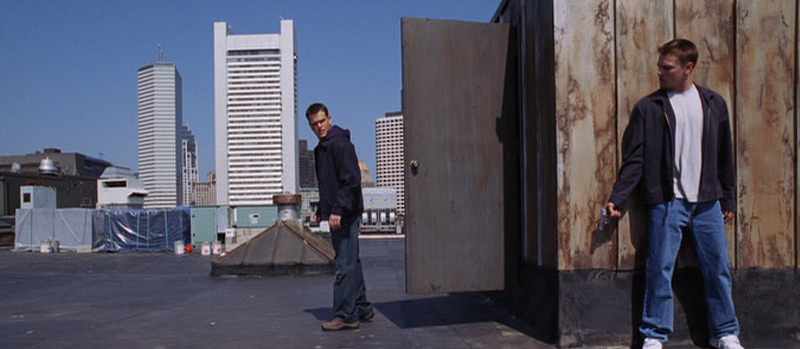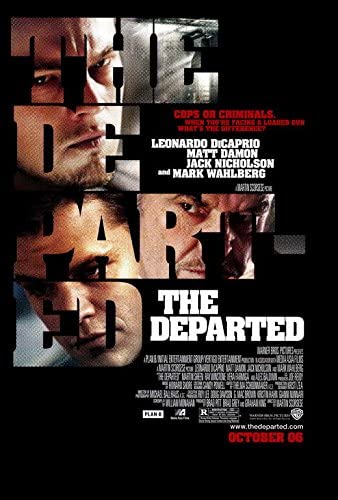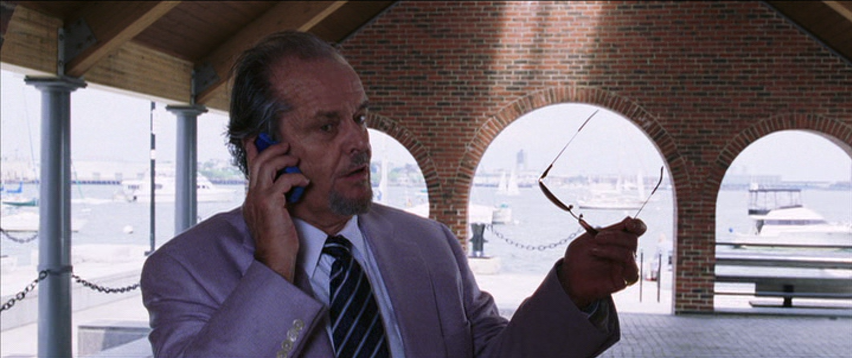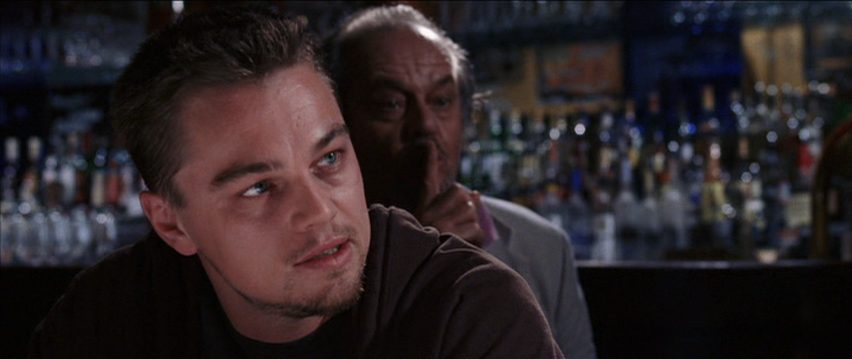

“I’m the guy who does his job. You must be the other guy.”
Although Martin Scorsese had built his illustrious reputation on gangster films like Mean Streets, GoodFellas, and Casino, he just as often went for unique projects that were personally interesting to him. Oddballs like After Hours, The Last Temptation of Christ, and Kundun occupy as much of his filmography as his calling card films. After a decade of making underseen passion projects and unique films that couldn’t quite capture the wide audience of previous efforts, Scorsese went all in on playing to his strengths, and the result is the glorious chaos of The Departed.
A remake of the 2002 Hong Kong film Infernal Affairs, The Departed transposes the narrative from Hong Kong to Boston and is loaded with top-level American talent. Whenever I describe this film to people, sometimes I forget to mention at least one of the bonafide A-listers that are in it. Leonardo DiCaprio, Matt Damon, Jack Nicholson, Mark Wahlberg, Martin Sheen, Vera Farmiga, Alec Baldwin. So the cast is uniformly excellent, and the whole thing is orchestrated by Scorsese at the top of his game. It is shot and edited at a rapid pace, cramming a large story spanning years into two and a half hours that pass quickly.

The simplified version of the story involves Frank Costello (Nicholson), a local crime boss, befriending a young Colin Sullivan (Conor Donovan) in the 70s. When he grows up, Sullivan (Damon) has become a mole for Costello within the Massachusetts State Police. At the same time, local misfit Billy Costigan (DiCaprio) has willingly been kicked out of the police force in order to go undercover. The plot revolves around each of those two trying to figure out who the rat is within their home team. We’re first given a nearly twenty minute barrage of backstory that unfolds frantically yet thoroughly. In that brief span, we learn so much about our main characters that it feels like we might as well be getting ready to watch the sequel, but all of that information was conveyed so effortlessly in such a short amount of time. In a display of his mastery, only after nineteen minutes does Scorsese cut to the title card.
Costigan reports to Captain Queenan (Sheen) and Sergeant Dignam (Wahlberg) who run the undercover unit. Although Wahlberg’s character has only a supporting role, he steals every scene he is in. Of course, the script gives him the memorable lines, but it is hard to imagine anyone else pulling it off. The plot is intricate and builds momentum beautifully. After a chance meeting between Sullivan and Madolyn Madden (Farmiga)1 the two begin seeing each other romantically. Madden is a police psychiatrist who is also responsible for seeing reforming criminals, so at the same time that she is contemplating committing to a future with Sullivan, she is also frequently interacting with Costigan.

Throughout the film, one of the main sources of tension with the police force is Queenan and Dignam’s refusal to give their undercover’s identities to other departments. Later in the film, Sullivan is put in charge of the effort to find the mole within the police force—to find himself, in other words. Sullivan has Queenan tailed when he happens to be going to a rendezvous with Costigan. Sullivan relays the information, Costello’s men arrive on the scene, and the situation escalates. Queenan ends up dead, Dignam resigns in protest at Sullivan having Queenan tailed, and all of a sudden no one knows who their undercover guys were.
The scenes with Costello are always tense. Nicholson is at his unpredictable best, recalling his performance as R.P. McMurphy in One Flew Over the Cuckoo’s Nest. Costigan gains his trust, but no one ever really trusts anyone else in The Departed. As tensions escalate and Sullivan is unable to identify the rat, Costello grows evermore paranoid and random, at one point showing up in the bar with blood all over himself.
The film’s climax occurs very near the end of its two and a half hours. It is handled deftly and is very satisfying. A false ending that doubles as a nod to The Third Man leads to a final scene that somewhat sets the world back on its axis for those viewers who require their stories to end with justice served.

The violence and profanity are both turned way up in The Departed. In lesser films, these elements can often be gratuitous and leave a putrid taste in my mouth. To some extent, I think the profanity could have been dampened a bit without any substantial effect on the film. But for the most part, the aesthetics of the film require the violence and language, and in most instances, the correct choices were made. Those hallmarks of Scorsese’s had become the territory of fellow auteur Quentin Tarantino in the preceding decade, with his films Reservoir Dogs, Pulp Fiction, and Jackie Brown cementing him as a star in his own right. With The Departed, Scorsese proved that he was still at the top of his craft.
To my eyes, the surface of the film is masterful. The acting, the dialogue, the mise en scène, the editing, the subtleties and the humor.2 It’s all top notch. But where the film really succeeds is in its explorations of human nature and guilt—an area that Scorsese has spent his own life and most of his career on. In the film, both young men become attached to the men that they are deceiving. Costigan seeks the approval of Costello, and Sullivan seeks the approval of his law enforcement superiors—most notably Captain Ellerby (Alec Baldwin). They have to act against their instincts in their every day lives in order to serve their larger purpose. The actors are acting, yes, but their characters are also acting, and the inner sense of self-deception is portrayed extremely well on screen.

Like so many of Scorsese’s films, his upbringing as a Catholic is woven into the fabric of The Departed. There are moments where it is onscreen—Costello chastising the priests at the diner about the sexual abuse scandal, cross-cuts of violence and sacraments similar to those found in The Godfather—but it is just as often found in the actions of its characters. They may have grown up and left the Church and its moral laws behind, but their worldview is still colored by its overarching ideas of right and wrong.
Scorsese is one of the most celebrated directors of modern film, and The Departed is a throwback to his glory days. Somehow, this film is the only one for which Scorsese was given the Academy Award for Best Director. If you have the stomach for it, watch it.
1. The scene where the two meet is one of the many truly great scenes in this film. It is a breath of calm in the midst of an otherwise breakneck and ruthless film. The dialogue and delivery is just superb, and so much information is exchanged between them and conveyed to the viewer in a few moments that it is just a joy to watch unfold.
2. For instance, there is a scene in which Farmiga lightly peels and fondles a banana while discussing Sullivan’s problems in the bedroom.